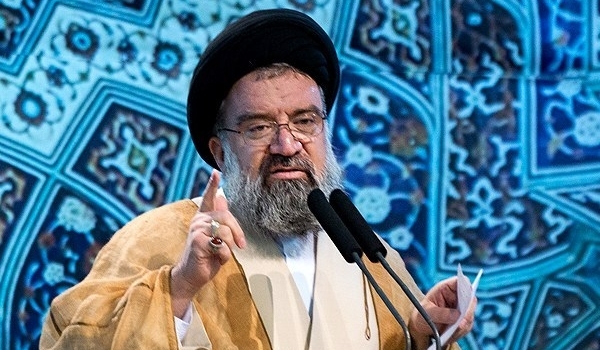
RNA – Tehran’s provisional Friday prayer leader, Ayatollah Sayyed Ahmad Khatami, said the threats made by the US presidential candidates against Iran to scrap the nuclear deal are nothing new as the US government always breaches its promises and defies its undertakings.
Addressing a large crowd of worshippers on Tehran University Campus on Friday, Ayatollah Khatami said the people of Iran will never trust the US government as it always breaks its promises and calls terrorists “good and bad,”, which is a disastrous policy.
“The snakes the West helped raise (in Iraq and Syria) are threatening their own masters now,” he added.
On a similar note, Supreme Leader of Islamic Revolution, Ayatollah Sayyed Ali Khamenei, also lashed out at the US government for not remaining loyal to its undertakings based on the July nuclear agreement between Tehran and the world powers.
“The Americans did not act on what they promised in the nuclear accord (the JCPOA); they did not do what they should have done. According to Foreign Minister (Mohammad-Javad Zarif), they brought something on the paper but prevented materialization of the objectives of the Islamic Republic of Iran through many diversionary ways,” Ayatollah Khamenei said, addressing a large group of people in the holy city of Mashhad last week.
“What a hue and cry did they launch in the case of the missiles: Why Iran has long-range missiles? Why they (Iranians) aim and point to the target so precisely? Why they (Iranians) tested and why you (we Iranians) do military exercise?” he asked.
“The Americans and one of the regional countries launch wargames every now and then in the Persian Gulf, which is several thousands of kilometers away of their country, while they have no responsibility there. Iran carries out military exercise in its own security boundary and home,” Ayatollah Khamenei stated.
Despite the January removal of economic sanctions against Iran, global enterprises are complaining that trade with the country is still difficult as a result of lingering fears of US punitive actions and restrictions.
Western media outlets report have quoted business leaders as saying that a key obstacle which is specifically affecting business with Iran is the unwillingness of UN-supported international banks to process transactions with the country.
US banks are still forbidden to do business with Iran and while lenders based elsewhere are not covered by this ban, major problems remain. Chief among these are rules prohibiting transactions in dollars from being processed through the US financial system.
The Iranian officials and business community believe the United States has failed to spell out exactly what is permitted and what is not, leading to the uncertainty that makes international banks reluctant to process Iranian-linked transactions.
Iranians based in Dubai, historically one of Iran’s main trading partners, complain they cannot get letters of credit to finance deals with their home country, while others have even had their company bank accounts closed in recent weeks.
The problems are also complicating Iran’s plans to sell more oil, as well as recover up to $100 billion in assets that had been frozen by the sanctions in foreign bank accounts.
The failure by European banks to play their due role in business with Iran has also provoked harsh reactions from several EU leaders and business leaders.
R111/112/C